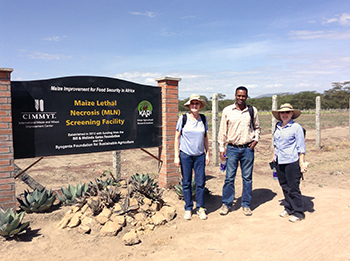Latest News Archive
Please select Category, Year, and then Month to display items
03 October 2024
|
Story Ansie Barnard
|
Photo Supplied
 From left to right: Londeka Mkhwanazi, Semither Mkhize, Salima van Schalkwyk, Slindokuhle Ndlovu, Asanda Mpinga, Mantombi Molefe, Ntombinkulu Khumalo, Mosebjadi Chauke and Thembinkosi Mkhwanazi.
From left to right: Londeka Mkhwanazi, Semither Mkhize, Salima van Schalkwyk, Slindokuhle Ndlovu, Asanda Mpinga, Mantombi Molefe, Ntombinkulu Khumalo, Mosebjadi Chauke and Thembinkosi Mkhwanazi.
The Amrut Foundation, in partnership with the University of the Free State (UFS), successfully hosted its Inaugural Innovathon at the UFS Qwaqwa Campus. This competition is designed to identify and support innovative products and services that not only generate profit but also contribute to the public good, with a strong emphasis on ethical business practices. Through this collaboration, students gain national exposure for their businesses and receive support to create sustainable social enterprises.
Five teams of student social entrepreneurs from the Qwaqwa campus were shortlisted to participate in the regional finals. Their selection was based on ventures that adhered to a social entrepreneurship model and demonstrated plans for long-term profitability and sustainability.
During the Innovathon, a panel of judges from the UFS, the Amrut Foundation, and the Small Enterprise Development Agency (SEDA) selected two outstanding teams to represent the UFS at the national finals, which will take place in October. The winning ventures, Biofly-Pro and Root Rescue were each awarded R20,000 to further develop and expand their initiatives.
Hemang Desai, Executive Director of the Amrut Foundation, expressed his enthusiasm for the event: "Amrut is proud to co-host the Free State leg of the inaugural Innovation Challenge with the UFS. Supporting students with entrepreneurial ambitions that align with societal care is one of our key focus areas."
Dr Grey Magaiza, Senior Lecturer and Deputy Director for the Centre for Gender and Africa Studies at the UFS, highlighted the importance of social entrepreneurship: “Social entrepreneurship is a collaborative effort towards creating sustainable and ethical business processes. The two winning projects embody these principles, and we look forward to their continued growth. In line with our Vision 130, social entrepreneurship can serve as a critical lever for university-community engagement.”
Congratulations to Biofly-Pro and Root Rescue on their well-deserved achievements!
Maize breeder rewarded for his research to enhance food security in Africa
2016-08-26

Prof Maryke Labuschagne from the UFS Department
of Plant Sciences, Berhanu Tadesse Ertiro, a
postgraduate student in Plant breeding at the UFS,
and Dr Peg Redinbaugh of the US Department of
Agriculture in Wooster, Ohio.
Photo: Supplied
Ethiopia is one of the African countries, deeply affected by food insecurity. Berhanu Tadesse Ertiro, a citizen from Ethiopia started his career - after graduating with his undergraduate degree in 2003 - as a junior maize breeder. Today he is pursuing his doctorate degree in Plant Breeding at the University of the Free State (UFS).
His research had made some great strides in contributing to food security in Africa. He recently received a fellowship from the prestigious Norman E. Borlaug Leadership Enhancement in Agriculture Program (Borlaug LEAP).
This fellowship is only awarded to students whose research has relevance to the national development of the student’s home country or region. The aim of these fellowships are to enhance the quality of thesis research of graduate students from developing countries who show strong promise as leaders in the field of agriculture and related disciplines.
Low soil fertility a major maize production constraint
Berhanu is also a visiting student at the International Maize and Wheat Improvement Center (CIMMYT) in Kenya, where he is running field experiments for his PhD thesis dissertation. His research focuses on Nitrogen Use Efficiency (NUE) and Maize Lethal Necrosis (MLN) disease tolerance. Low soil fertility and MLN are among the major maize production constraints in eastern and southern Africa, where maize is staple food.
Such hybrids have the potential to contribute greatly
towards food security among farmers and their
families through increased productivity.
The use of new tools could increase breeding efficiency and reduce the time needed for the release of new stress tolerant hybrids. Such hybrids have the potential to contribute greatly towards food security among farmers and their families through increased productivity. Berhanu is looking at the feasibility of genome wide selection for improvement of NUE in tropical maize.
Fellowship includes mentorship and supervision across borders
The programme supports engaging a mentor at a United States university and Consortium of International Agricultural Research Centers (CGIAR). During his fellowship, he will be supervised and mentored by Prof Maryke Labuschagne of the UFS, Prof Rex Bernando, a professor of Corn Breeding and Genetics at the University of Minnesota and Dr Biswanath Das of CIMMYT, Kenya.
As a LEAP fellow, Berhanu was invited to attend the 30th Annual World Food Prize events to take place in October 2016, in Des Moines, Iowa. The week will include his attendance at the Board for International Food and Agricultural Development meeting, participation at side-events at the Borlaug Dialogue International Symposium and the World Food Prize.